- Home
- Jim Thompson
Now and on Earth Page 7
Now and on Earth Read online
Page 7
On the way Gross said, “I’m glad you took over the books. I wanted Moon to let me off of them.”
“Glad I could help you out,” I said. “They are pretty much of a headache.”
“Haven’t got them straightened out yet, huh?”
“No.”
“I thought Moon said you were an A-1 bookkeeper.”
I didn’t say anything.
“I guess you think I don’t know how to keep books. I suppose you told Moon you couldn’t fix up the books because I made so many mistakes.”
“I haven’t discussed you with Moon,” I said. “If you want to let me out I’ll walk the rest of the way.”
“No, you won’t either,” he said. “I was just talking.”
When we reached the house, I thanked him and started to get out.
“Wait a minute,” he said. “I want to show you something.”
While I watched, he took an old envelope and a fountain pen from his pocket, and, after several preliminary gyrations of his hand, executed a picture of a bird with one flourish.
“Can you do that?” he asked.
I admitted that I couldn’t.
“Well—keep that, then,” he said regally, and tossed it into my lap.
Of course, I had to ask him to autograph it. And I’ll be damned if he didn’t do it!
11
My fifth week—more accurately, the beginning of the sixth.
Things at the plant are in a worse tangle than ever; I’ve got a raise; Shannon has been very sick.
There’s not much use talking about the first item.
The raise I got last Friday. I was working away at the books for dear life—I mean that literally—when Moon and a little fellow I’d seen wandering around the plant but had never paid much attention to came up to my desk.
“Dilly,” said Moon, “Mr. Dolling wants to talk to you. Mr. Dolling is the superintendent of all the stockrooms.”
There wasn’t the slightest change in his voice or expression, I’m positive; he was as lackadaisical and phlegmatic as always. And, yet, somehow, I sensed a sneer, and I think Dolling sensed it also.
Dolling is barely five feet tall, pot-bellied, sandy of hair (what little he has), and he has a voice that would awaken any dead who weren’t completely decomposed. There is a rumor that he owns a big slice of stock in the company, but I don’t know whether it’s true.
He looked at Moon sharply. “All right. Thank you.”
Moon said, “Don’t mention it,” and walked away.
Dolling turned back to me. “Mr. Moon,” he said, in his rodeo-announcer’s voice, “tells me that you are a very conscientious worker.”
“Well—thank you,” I said.
“I’ve noticed a small improvement in things myself,” he continued, bellying up to the desk so that he was at my side instead of facing me. “Did you understand the conditions under which you went to work here?”
“Why, I don’t know exactly what you mean,” I said. “I believe I understood them.”
“According to company policy—a long-established policy—any man who passes our thirty-day probationary period is entitled to a four-cent raise. We state this very clearly in the company rule book. But we don’t run this company any more; the union runs it. They gave us a contract and we signed it with a gun at our heads. And the contract—the union contract, mind you, not ours—specifies that any man who has worked here sixty days and is not drawing fifty-eight cents an hour is entitled to demand a raise to that amount. It says nothing whatever about raising you to fifty-four cents after thirty days. Now I have nothing against the union whatsoever. If a man in this company wants to join the union, I will not persuade him to do otherwise. I definitely will not say, and I am not saying, anything against the union. Understand?”
“Of course,” I said.
“I’m just explaining our position. Before, it was our policy to raise all approved probationers to fifty-four cents. Now, since the union doesn’t care, why should we?”
“I suppose you shouldn’t,” I said.
“But Moon tells me you’re a good man,” he said. And paused for confirmation.
“Thank you.”
“And I must say that in this case I believe Moon is right”—pause.
“Thank you, sir.”
“You seem to be the type of man we like to have around. Industrious”—pause.
“Yes, sir.”
“Sober.”
“Yes—sir.”
“Conservative.”
“Y-yes, s-sir.”
“So we are raising you to fifty-four cents an hour, effective this pay period. That’s all.”
He paced away, hands folded behind his back.
When Moon showed up again, I started to tell him about the raise, but he’d already heard about it he said.
“I was just down in Planishing,” he said. “I didn’t have any trouble hearing while he was talking to you.”
Well—four cents an hour isn’t much, only a couple of dollars extra on the week, but it did make me feel kind of good. And I suppose the folks saw how I felt and they didn’t kid me about it even when I invited it by kidding myself. Everyone said that the company must think a lot of me to make an exception like that.
After a good deal of very friendly debate we decided to spend the extra two on a Sunday dinner, with me planning and preparing the menu. I can cook, you know; I mean I did it, many years ago, for a living.
I started for the store, and Shannon asked me if she could go along. And of course I said she couldn’t, because I was afraid she might start something. I should have known that there was something wrong with her or she wouldn’t have asked; she’d’ve just gone. But I didn’t think, and surprisingly enough she didn’t come anyway. She just got up and went back into the bedroom and closed the door.
She wasn’t around at supper time, but we didn’t think anything of it; she’s in the habit of keeping her own hours. But along about eight o’clock we began to get worried and we started looking for her. I won’t tell you where all we looked—I even went clear down to the bay. To make it short, I found her in the closet in our bedroom. I’d gone in there to get a jacket because it was getting kind of cool, and when I lifted it off the hook I knocked some dresses down and I saw Shannon.
She was way back in the corner, sitting on the floor. She’d got Frankie’s manicure set and some lipstick and other cosmetics and she was a sight.
“Oh, my God,” I said. “Now, what will your mother say? Don’t you know we’ve been looking all over the country for you? Can’t you ever behave yourself? Come on out of there!”
She got up and held out her hands, and like a damned fool I didn’t understand. “Now don’t daub that stuff all over my pants! For Christ’s sake come on out and wash yourself and eat something if you want it, and go to bed.”
“Don’t you think my hands are pretty, Daddy?” she said.
And then I began to catch on. But at that moment Roberta came up. She let out a wild shriek.
“Shannon! Look at your dress! And you’ve got that stuff all over my suede shoes. And—”
She grabbed her and began to slap her, and Shannon didn’t fight back. And then she, Roberta, began to understand and she got down on her knees and hugged and kissed her.
“Of course you’re pretty! You’re the prettiest girl in this whole wide world! Wasn’t that nice of her, Daddy, to make herself so pretty for us? Just think! All this time she was b-back—”
We were all crying—even Jo and Mack. We were all thinking. A little girl, a four-year old, back in that dark closet for four hours. A little girl who had never been wanted—and who, I realize now, knew that she had never been wanted—trying to make herself wanted; fighting at the last ditch with a weapon she had always scorned to use. Trying to make herself pretty. I thought of her fierceness, how with the animal’s desperate impulse for survival, she had struggled against neglect and slight. The tantrums she had thrown to secure a new dress or a warm coa
t; her swiftness in striking before she could be struck; her dogged determination to have the food she desired—and needed. Yes, and her wakefulness, the fear of attack in her sleep.
And I thought of how, during those four years that she had been with us, she must have wept in her heart, even as she fought and screamed; the loneliness that must have been hers; the fear and dread. And I thought Why did it have to be this way, and, as with everything else, I could find no answer.…
I was a 125-dollar-a-month editor on the Writers’ Project that year. And Pop was losing his mind and I didn’t know it. He came to me with a proposition—a lease deal—and it looked good. And I borrowed 250 dollars to swing it. Pop could never give a coherent explanation of where the money went. But it did go, never more to return, and I had fifty dollars a month to pay back out of my salary.
Our rent was forty dollars. You can see how it was.
One night I found Roberta in a faint on the bathroom floor, a swollen twist of slippery-elm bark protruding from her. And I thought she would be pulled apart before we could remove it. But Shannon—the bubble, the egg, whatever you want to call it—held firm. We went to see a woman down in Southtown. She took fifteen dollars from us, and prodded and poked Roberta with something that looked like a bicycle pump. She poked and pulled and pushed for more than an hour, and Roberta bled and fainted and writhed with the knowledge of the damnation that was to be hers. And Shannon fought again and won.
She fought the sitz baths, the cotton root and ergot, the quinine. She fought the jolts that came from Roberta jumping off the divan, from climbing stairs, from hanging up clothes. No, I’m not being romantic. She did fight. You could feel her indomitability. Feel it and hate it as you would hate a drowning person who threw his arms around your neck.
Then the doctor said it looked like she would be a Christmas baby—yes, sir, it did. And, finally, as the days passed, he became sure of it. And Roberta and I became ashamed of ourselves, and silently we prayed to Shannon for forgiveness. It would be all right now. We wouldn’t starve. We could pay the doctor and the hospital. We’d always wanted her, we said. It was just that we didn’t see how we could. Now, it would be all right.
I should explain that Christmas babies in our town were sort of municipal property. All the banks and loan sharks made up cash purses. The stores donated clothing and furniture and food. You got a year’s supply of milk and ice and stuff like that for nothing. You got—well, you got just about everything. You know. They probably do things the same way all over the country.
At eleven o’clock on Christmas Eve I was sitting at Roberta’s bedside in the hospital. The local florists had got wind of what was up, and flowers were already beginning to arrive. There was candy, too, and a big cake from one of the bakeries with “Happy Birthday Xmas Babe” spelled out on the icing. Even some reporters had been there to interview Roberta and snap her picture for the morning papers. Of course, the doctor was there, pacing back and forth and gloating over all the free publicity he was going to get, and asking the “little lady” how she felt.
She felt fine. Not too good understand. But good enough. She felt, in short, like she was going to have the baby on Christmas day.
Maybe it was the excitement. Maybe Shannon, distrusting us, sensed our will and rebelled against it.
But at eleven-thirty Roberta’s lips stiffened, and she groaned.
The doctor wasn’t alarmed. It wasn’t a real bearing-down pain. He was sure that—
She groaned again. Her stomach revolved like a football being rolled inside a sweater. She clutched herself, and the involuntary spasms of her stomach rocked her back and forth.
“I won’t!” she screamed. “I won’t, I won’t, I won’t!”
They wheeled her out to the delivery room, the doctor pathetically tagging along behind the nurses, and the closing door cut off Roberta’s hate-filled and outraged protests.…
Shannon was born at twelve minutes of twelve.
I cannot say that we were cruel to her. Roberta may sometimes have neglected to heat her milk or change her diapers, but Roberta was sick a great deal. I may have smoked too much too close to her, and kept her awake with my typewriter. But I was trying to write a novel, the advances on which were necessary for our existence. I suppose that the worst I can say is that our kindness and attention were deliberate. We had to think about doing things for her. Occasionally, conscience stricken, we’d smother her with gifts and caresses. But we always had to think—we never did it automatically. And to Shannon, I guess, it seemed a long time between thoughts.
Our spasmodic fits of affection upset her, and she learned to fight against them. She distrusted us, so she ordered her own life; and, all things considered, I think she did well.
There was a summer evening, when she was about two, when we were all sitting out on the lawn of our home. Shannon suddenly announced that she had to go to the toilet. Roberta declared that she didn’t.
“She’s just trying to make me get up, Jimmie,” she said. “I never sit down for a minute that she doesn’t think of something.”
“Have to go,” said Shannon.
“Well do it in your pants then,” said Roberta.
“Hurt bottom,” said Shannon. “You take me, Daddy.”
I started to get up, but Roberta said, “No, don’t you give in to her now, Jimmie.” So I sat back down again.
“You don’t really have to go, baby. Wait a minute and you’ll get over it.”
“Have to go,” she repeated.
“Go by yourself then,” snapped Roberta. “All I hope is that a big bitey gets you.”
Shannon looked toward the dark house, and her knees shook a little. And then her head went back and she marched up the steps and through the door.
She was still gone after fifteen minutes, so I went in, and there she was sitting on the stool and grinning toothlessly to herself. And she had had to go; there was no doubting that.
“Stink the biteys,” she said. “Stinkem to def.”
Fighting, fighting.…
Shortly before she was three we took a house adjacent to one of the parks. One day when I was escorting her and Jo there, we saw an old man approaching, and Jo shrank behind me.
“That man,” she whimpered, “he said he was going to cut my ears off.”
“Oh, he was just joking,” I laughed. “You’re not afraid, are you, Shannon?”
“Uh-uh,” said Shannon. “I fix him.”
She was carrying an enormous rag doll with a china head. Before I could stop her, she was down the sidewalk, had drawn the doll back over her shoulder, and had hurled it with all her astonishing energy straight into the old man’s solar plexus. I’m not exaggerating when I say it almost killed him.
You couldn’t scare her by the mention of policemen. The mere fact that we told her they would get her for her misdeeds was proof to her that they were vulnerable. It got so bad that we couldn’t take her downtown. At the sight of a cop she was off, fists flying, mouth open to bite and slash. And even at two and three she could inflict serious damage. We were warned officially, more than once, that if we didn’t do something about her, it would be just too bad.
She wasn’t afraid of—well, she just wasn’t afraid. In her lonely friendless world she had survived the horror of not being wanted, and she knew there was nothing worse to fear.
We tried, we tried very hard to make things up to her. Remembering, we would buy her some trinket or article of clothing that Jo actually deserved. But with the coming of Mack, with his square shoulders and low chuckle, it was harder to remember.
And Shannon made overtures which we seldom understood. Like the time she washed Roberta’s bedspread in the toilet. Or—well, like the other night when she brought me that nickel “to buy whisky with.” (I’m glad I didn’t bawl her out for that.)
After the sound and fury had died Roberta might say, “But why didn’t you ask Mother and Daddy first?” And Shannon, not knowing how to translate the whisper of her instinct
s, not knowing how to say that she did not ask us because she did not think we knew, would stand mute. Grinning or glaring; furious, and amused, and sick. But never defeated; ready to fight until the last tick of her tiny heart.
She wouldn’t eat any supper that night. She kept saying that she was tired, and she wanted me to hold her. She didn’t seem to have any fever, but after a while she began to complain about being hot. So I picked her up—she weighs almost nothing—and walked outside with her. I carried her over to the park, then down to the bay, her fingers twined in my jacket, her great blue eyes reflecting the stars. And when I wanted to sit down on one of the pilings she still fussed that she was hot.
“Look, baby,” I said. “Daddy’s hot, too. How about going home, and getting a bottle of beer, and we’ll sit out on the steps together.”
She deliberated a moment, staring blankly at me. “Go to my store,” she said.
“Oh, now, baby,” I said. “Not tonight. Daddy’s—”
“You go to my store,” she said. “You hear? My store, my store, my—”
“All right, all right,” I said. “Just don’t get excited. We’ll go. We’re going right now.”
So we went. And I will never be happier or more sad over an act of mine.
It had never occurred to me, I suppose, that Shannon would be welcome any place. But here she was more than welcome. The car-hop girl, who had been slouching in front of the place, seemed to come alive when she saw her. She came rushing over and wanted to take Shannon out of my arms, but Shannon wouldn’t go, so she contented herself with pinching her cheeks and running her red-fingernailed hands through her hair.
“How’s my brat, tonight?” she cooed. “Wanta fight me, brat? Huh? Wanta fight Alice?”
She went inside with us and called to the soda jerker, “Hey, Ray. Here’s our brat. Draw us a tall carbolic and arsenic without ice.”
“Now, don’t you call Shannon a brat,” admonished Ray. “Shannon’s my sweetheart. We’re going to get married, aren’t we, Shannon?”

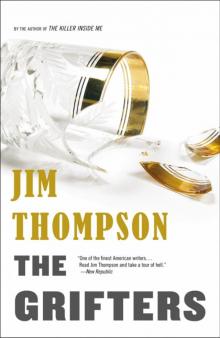 The Grifters
The Grifters The Transgressors
The Transgressors Texas by the Tail
Texas by the Tail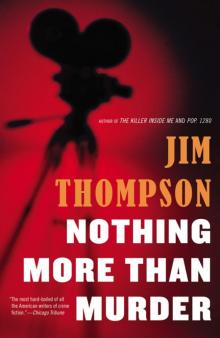 Nothing More Than Murder
Nothing More Than Murder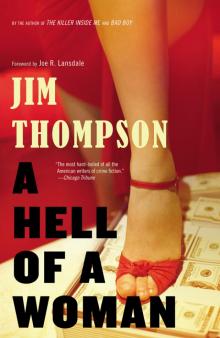 A Hell of a Woman
A Hell of a Woman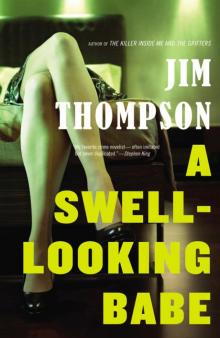 A Swell-Looking Babe
A Swell-Looking Babe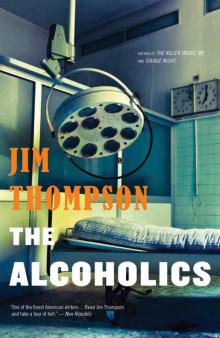 The Alcoholics
The Alcoholics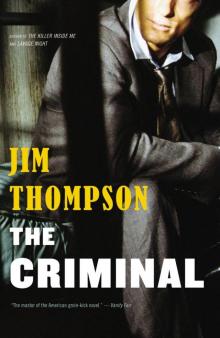 The Criminal
The Criminal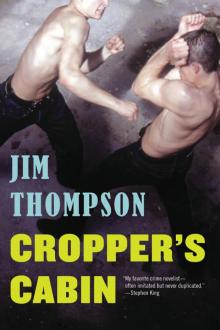 Cropper's Cabin
Cropper's Cabin South of Heaven
South of Heaven King Blood
King Blood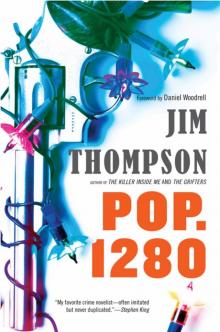 Pop. 1280
Pop. 1280 Wild Town
Wild Town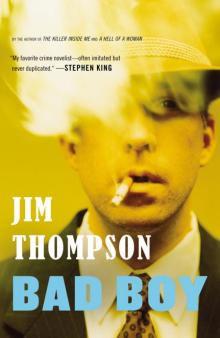 Bad Boy
Bad Boy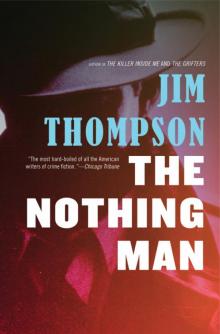 The Nothing Man
The Nothing Man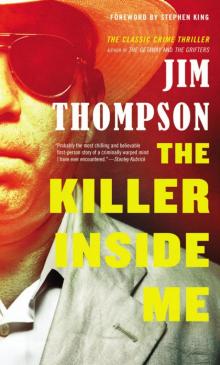 The Killer Inside Me
The Killer Inside Me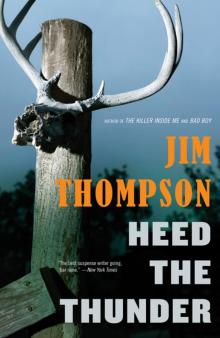 Heed the Thunder
Heed the Thunder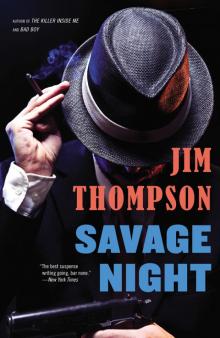 Savage Night
Savage Night Recoil
Recoil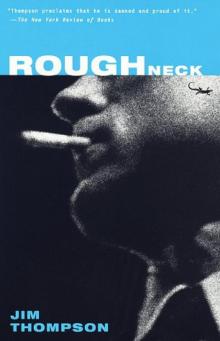 Roughneck
Roughneck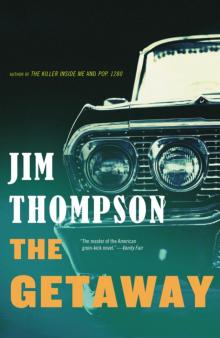 The Getaway
The Getaway